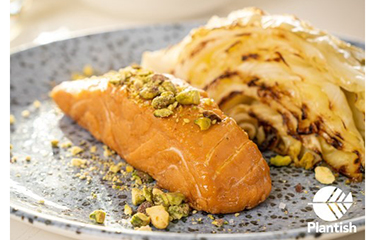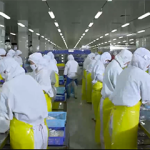Data shows plant-based seafood analogs, cell-cultured seafood booming

Plant-based food and seafood analog sales are booming in the United States, and cell-cultured seafood suppliers are obtaining funding needed to advance their growth plans.
Despite “turbulent economic conditions amplified by the pandemic, supply chain issues, and inflation” the Plant Based Foods Association, the Good Food Institute, and SPINS said in a press release that new data shows U.S. retail sales of plant-based foods grew 6.2 percent in 2021. Overall, the total value of the plant-based market reached an all-time high of USD 7.4 billion (EUR 6.7 billion).
Plant-based seafood analog sales surged 42 percent from 2019 to 2021, GFI Corporate Engagement Project Manager Emma Ignaszewski, and author of the "2021 U.S. retail market insights: Plant-based foods report," told SeafoodSource.
Sales of plant-based shellfish analogs – which include plant-based analogs for shrimp, scallops, and crab – grew 30 percent, and plant-based fish analogs grew 9 percent in 2021.
Plant-based fish accounts for the majority (around 75 percent) of the plant-based seafood analog market in terms of sales, while plant-based shellfish makes up the other quarter, according to Ignaszewski.
Overall, plant-based food analog retail sales grew three times faster than total food retail sales, with most plant-based categories outpacing their conventional counterparts, Ignaszewski said.
The number of plant-based seafood products on retail shelves is also increasing. Eight new plant-based seafood analog products debuted in 2021, bringing the number of plant-based seafood products available in the U.S. up to 40.
“In contrast, more-developed categories like plant-based beef have hundreds of SKUs in the marketplace – more options, at varied price points, merchandised across departments including the fresh meat case,” Ignaszewski said.
Even with the growth, plant-based seafood analogs accounted for only an estimated 0.1 percent of the total retail dollar share amount of all seafood products in 2021, according to IRI. However, retail plant-based seafood sales could grow by an estimated USD 220 million (EUR 200 million) “if the category were able to capture the same dollar share of the seafood market that plant-based meat currently has of the meat market,” Ignaszewski said.
“Because 65 percent of seafood sales in the U.S. occur in foodservice, this opportunity is an underestimate of the total market opportunity, which is likely much greater,” Ignaszewski added.
Separately, investments continue to flood into both the plant-based seafood analog and cellular seafood market.
Rehovot, Israel-based Plantish, which uses plant proteins to create whole-cut fish, raised USD 12.45 million (EUR 11.3 million) in seed funding. It is the largest seed round to date in the burgeoning alternative seafood market, the company said in a press release. The round was led by State Of Mind Ventures, with participation from Pitango Health Tech, Unovis Capital, TechAviv Founder Partners, SmartAgro, E2JDJ, Alumni Ventures, and OurCrowd.
The company previously raised USD 2 million (EUR 1.8 million) in pre-seed funding last June, from TechAviv Founder Partners, a venture fund backed by industry veterans and angel investors including chef José Andrés and Nuseir Yassin from Nas Daily.
Plantish’s first product, Plantish salmon, “mimics cooked salmon in taste, texture, appearance, and structure, while also having the same nutritional values as its conventional counterpart, with high protein and omega-3 content.”
Plantish will be launching the alternative salmon in pop-up locations at the end of this year, and officially launching it nationwide in U.S. restaurants by 2024.
Another Israeli cellular seafood company, Nes-Ziona, Israel-based startup Wanda Fish Technologies, has signed two agreements with Tufts University to advance the company’s goals in the emerging field of cell-cultured fish, the company said in a press release.
Under a licensing agreement, Wanda Fish gains exclusive rights to certain intellectual property in fish-cell cultivation developed by Tufts researcher David Kaplan, a leader in the field of cellular agriculture, the start-up said in a press release. In additon, a two-year sponsored research agreement with the university supports Kaplan’s research into cellular agriculture-based production of fish tissue.
“Taken together, the moves will significantly propel Wanda Fish’s strategies for producing sustainable, tasty, cultivated fish fillets,” the company said.
And GTFO It's Vegan has secured national U.S. distribution of its GreatFoods It's Vegan sashimi line with both Kehe and Sysco.
With a 16-distribution center network across North America, “KeHE is one of the largest and most respected pure-play grocery and natural distributors in the nation,” while Sysco is a the leading global foodservice distributor, GTFO said.
GTFO's GreatFoods It's Vegan tuna and salmon sashimi is also on the menu at Beyond Sushi, a chain of vegan sushi restaurants with multiple locations in New York City.
In November 2021, Carson, California, U.S.A.-based seafood supplier and distributor Southwind Foods struck a distribution deal with Sophie’s Kitchen, a maker of plant-based seafood and protein analog products.
Southwind will dedicate a sales division to plant-based products and will offer Sophie’s Kitchen products to its foodservice and retail clients, venture capital platform company Billy Goat Brands said in a press release.
Photo courtesy of Plantish






Share